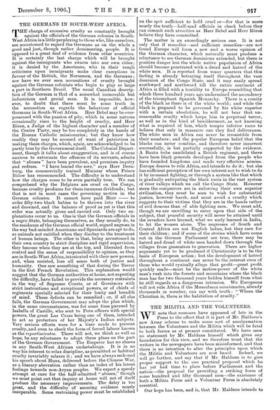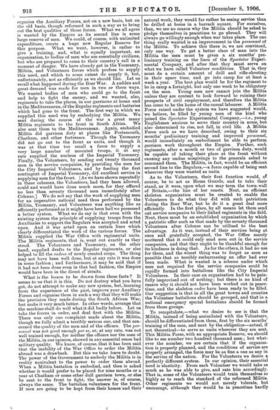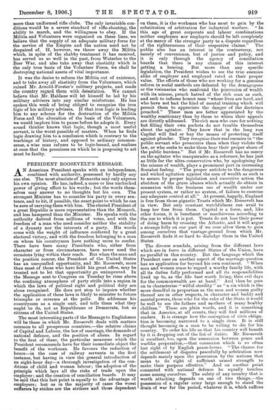THE MILITIA AND THE VOLUNTEERS.
WE note that rumours have appeared of late in the Press to the effect that it is part of Mr. Halda.ne's new Army scheme to make some sort of amalgamation between the Volunteers and the Militia which will be fatal to both forces as at present constituted. We have seen no statement by Mr. Haldane himself which gives any foundation for this view, and we therefore trust that the writers in the newspapers have been misinformed, and that there is no intention to alter the principles upon which the Militia and Volunteers are now based. Indeed, we will go farther, and say that if Mr. Haldane is to give proper support to the one practical proposal which he has yet had time to place before Parliament and the nation—the proposal for providing a striking force of some hundred and fifty thousand men—the existence of both a Militia Force and a Volunteer Force is absolutely essential.
Our hope has been, and is, that Mr. Haldane intends to organise the Auxiliary Forces, not on a new basis, but on the old basis, though reformed in such a way as to bring out the best qualities of those forces. What we all agree is wanted by the Empire as its second line is some large reserve of men. We could, of course, with unlimited expenditure, create a huge new Regular Reserve for this purpose. What we want, however, is rather to give a training, and, what is equally important, an organisation, to bodies of men who are essentially civilians, but who are prepared to come to their country's call in a moment of danger. We have already got in the Yeomanry, Militia, and Volunteers forces which profess to supply this need, and which to some extent do supply it, but, unfortunately, not as efficiently as we should like. Let us recall what happened during the Boer War. A sudden and great demand was made for men in two or three ways. We wanted bodies of men who could go to the front and help to fight the enemy, and we wanted, also, regiments to take the places, in our garrisons at home and in the Mediterranean, of the Regular regiments and batteries which had gone to the front. The first way in which we supplied this need was by embodying the Militia. We sent during the course of the war a great many Militia regiments to the front in South Africa. We also sent them to the Mediterranean. Again, embodied Militia did garrison duty at places like Portsmouth, Chatham, and other fortresses. Though the Yeomanry did not go out to the front as units, and though it was at that time too small a force to supply a very large number of mounted troops, it at any rate supplied the nucleus of the Imperial Yeomanry. Finally, the Volunteers, by sending out twenty thousand men in the service companies, by providing the men for the City Imperial Volunteers, and by feeding the first contingent of Imperial Yeomanry, did excellent service in supplying men for the front. [As we have shown repeatedly in these columns, the Volunteers, had they been allowed, could and would have done much more, for they offered no lees than seventy thousand men immediately after Colenso.] We do not say that the work of supplying men for an imperative national need thus performed by the Militia, Yeomanry, and Volunteers was anything like as efficiently performed as it might have been had we possessed a, better system. What we do say is that even with the existing system the principle of supplying troops from the Auxiliaries to support the Regulars was accepted and acted upon. And it was acted upon on certain lines which clearly differentiated the work of the various forces. The Militia supplied the War Office with regimental units. The Militia regiments, that is, went out exactly as they stood. The Volunteers and Yeomanry, on the other hand, supplied drafts to the Regular regiments, or else helped to fill the cadres of newly created corps. The thing may not have been well done, but at any rate it was done in some fashion ; and furthermore, it may be said that if it had not been done even in that bad fashion, the Empire would have been in the direst of straits.
What is the lesson to be drawn from these facts ? It seems to us that it is this. Do not destroy what you have got, do not attempt to make any new system, but, learning from the experience of the past, improve your Auxiliary Forces and organise them in such a way that they will make the provision they made during the South African War, but make it very much better. In other words, arrange that the machine shall do well what it did badly before. Let us take the forces in order, and deal first with the Militia. There was only one complaint made about the Militia, though we fully admit a terribly serious one, and that con- cerned the quality of the men and of the officers. The per- sonnel was not good enough per se, or, at any rate, was not well trained enough, for neither the officers nor the men of the Militia, in our opinion, showed in any essential sense bad military quality. We know, of course, that it has been said that the inability of the War Office to order the Militia abroad was a drawback. But this we take leave to doubt. The power of the Government to embody the Militia is in reality equivalent to the power to order them abroad. When a Militia battalion is embodied, and then is asked whether it would prefer to be placed for nine months or a year at Chatham or some other dull garrison town, or else be sent to the front to fight, the answer is, of course, always the same. The battalion volunteers for the front. If men are going to be kept from their homes 'and their natural work, they would far rather be seeing service than be drilled at home in a barrack square. For ourselves, then, we see no reason why the Militia should be asked to pledge themselves in peacetime to go abroad. They will always go willingly enough when wax takes place. The one thing really wanted is an improvement in the personnel of the Militia. To achieve this there is, we are convinced, only one way. To get a better class of man into the Militia the men must be given a six months' pre- liminary training on the lines of the Spectator Experi- mental Company, and after that they must serve on what we have called Volunteer conditions. That is, they must do a certain amount of drill and rifle-shooting in their spare time, and go into camp for at least a week a year. The best plan would be for the regiment to be in camp a fortnight, but only one week to be obligatory on the men. Young men now cannot join the Militia unless they are content to look forward to ruining their prospects of civil employment, and therefore the Militia has come to be the home of the casual labourer. A Militia Force raised under the system we have suggested would, we believe, be filled by young men of the kind, who joined the Spectator Experimental Company,—i.e., young Englishmen anxious to serve their country in arms, but also determined to rise, not fall, in civil life. A Militia Force such as we have described, owing to their six months' preliminary training and improved personnel, would immediately on embodiment be able to perform garrison work throughout the Empire. Further, such regiments, after a month or two of garrison duty, would be capable of taking their place at the front without causing any undue misgivings to the generals asked to command them. The Militia, in fact, would be an efficient second line to the Regulars,—a force capable of being sent wherever they were wanted as units.
As to the Volunteers, their first function would, of course, be to act as Home Guards, and to take their stand, as it were, upon what we may term the town-wall of Britain,—the line of her coasts. Next, an efficient skeleton organisation must be created to enable the Volunteers to do what they did with such patriotism during the Boer War, but to do it a great deal more efficiently. In the first place, by all means let them send out service companies to their linked regiments in the field. Next, there must be an established organisation by which a patriotic offer such as that made by the seventy thousand Volunteers after Coleus° can be utilised to the best advantage. As it was, instead of their services being at once and gratefully accepted, the War Office merely muttered that it could only send men out in the service companies, and that they ought to be thankful enough for its kindness in doing that. As for the others, it had no use for them, and the wisest thing was to forget as soon as possible that so terribly embarrassing an offer had ever been made. What is wanted is a scheme under which men not required for the service companies could be rapidly formed into battalions like the City Imperial Volunteers. In their case an organisation had to be pain- fully improvised out of nothing; but there is no kind of reason why it should not have been worked out in peace- time, and the skeleton cadre have been ready to be filled. Our suggestion is that in all the great towns and counties the Volunteer battalions should be grouped, and that' in a national emergency special battalions should be formed from these groups.
To recapitulate,—what we desire to see is that the Militia, instead of being assimilated with the Volunteers, should be differentiated from them, first by the six months' training of the men, and next by the obligation—actual, if not theoretical—to serve as units wherever they are sent. This Militia Force, with an appropriate Reserve, we should like to see number two hundred thousand men ; but what- ever the number, we are certain that if the organisa- tion is properly planned, and the conditions of service are properly arranged, the force may be as fine a one as any in the service of the nation. For the Volunteers we desire a perfectly different system. In our opinion, their essential need is elasticity. From each Volunteer we would take as much as he was able to give, and rate him accordingly. That is, some of the Volunteers would train themselves so highly as to reach the standard of the reformed Militia. Other regiments we would not merely 'tolerate, but encourage, although they Would be in peacetime hardly more than uniformed rifle clubs. The only invariable con- ditions would be a severe standard of rifle-shooting, the ability to march, and the willingness to obey. If the Militia and Volunteers were organised on these lines, we believe that the supply of an adequate military force for the service of the Empire and the nation need not be despaired of. If, however, we throw away the Militia which, in spite of the shabby treatment it has received, has served us so well in the past, from Waterloo to the Boer War, and also take away that elasticity which is the only true basis of the Volunteer Force, we shall be destroying national assets of vital importance.
It was the desire to reform the Militia out of existence, and to take away all elasticity from the Volunteers, which ruined Mr. Arnold-Forster's military projects, and made the country regard them with detestation. We cannot believe that Mr. Haldane will let himself be led by his military advisers into any similar misfortune. He has spoken this week of being obliged to recognise the iron logic of his military advisers. If that iron logic is leading him to any scheme for the destruction of the Militia Force and the alteration of the basis of the Volunteers, we would implore him to pause before he adopts it. Every sound thinker knows that logic, though a most useful servant, is the worst possible of masters. When he finds logic drawing him to a conclusion which is contrary to the teachings of history, and opposed to ordinary common- sense, a wise man refuses to be logic-bound, and realises at once that the premisses on which he is proposing to act must be faulty.




























































 Previous page
Previous page